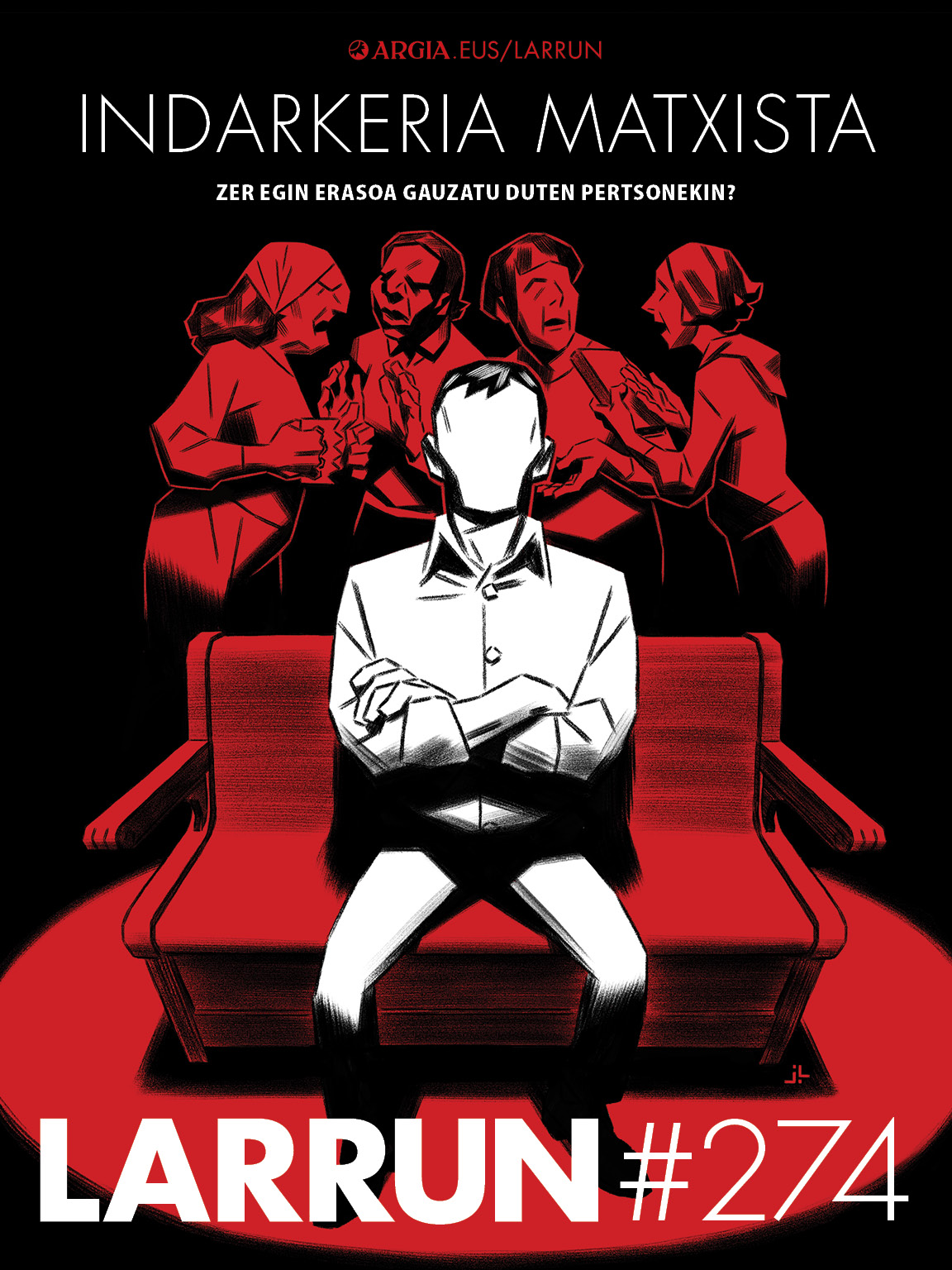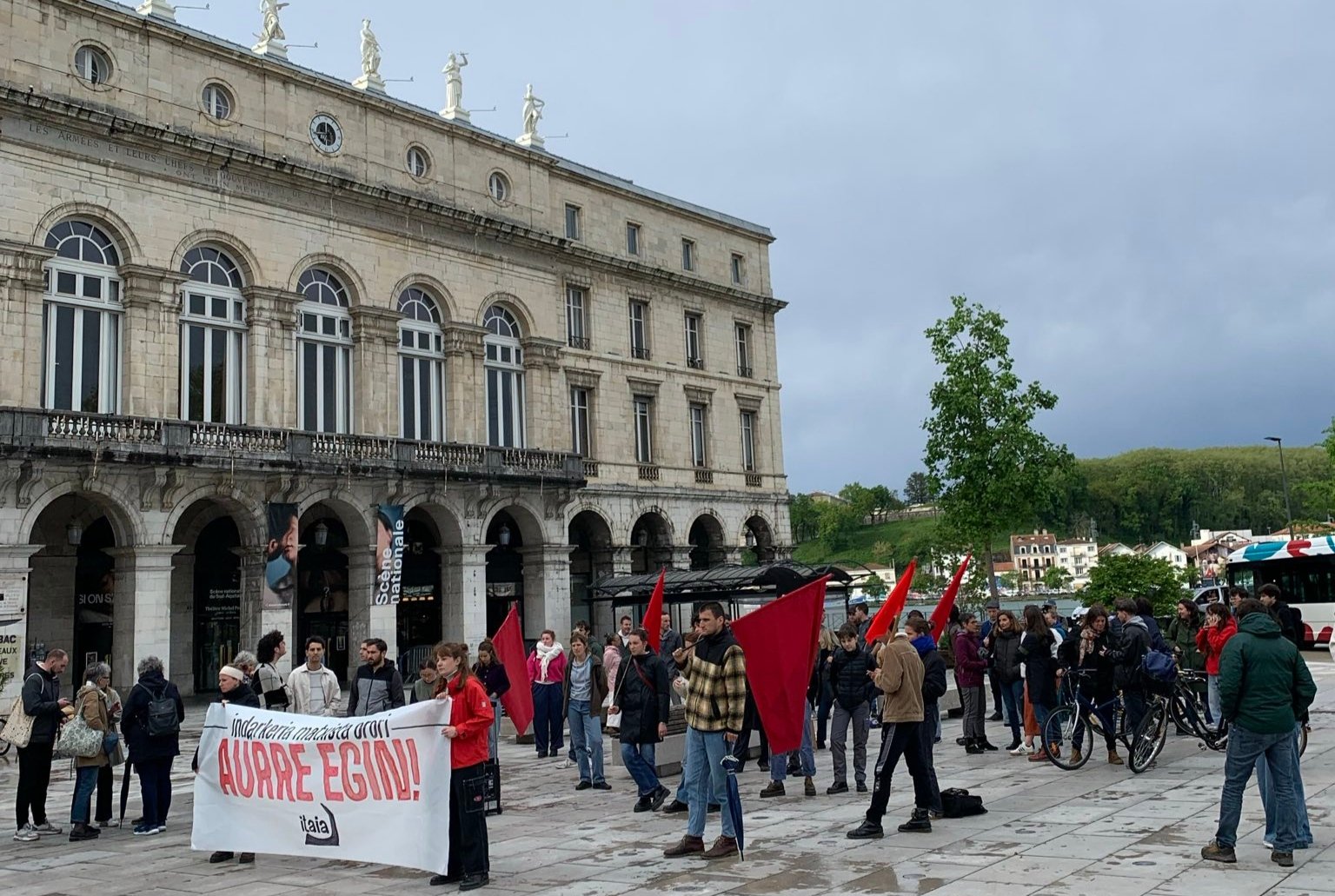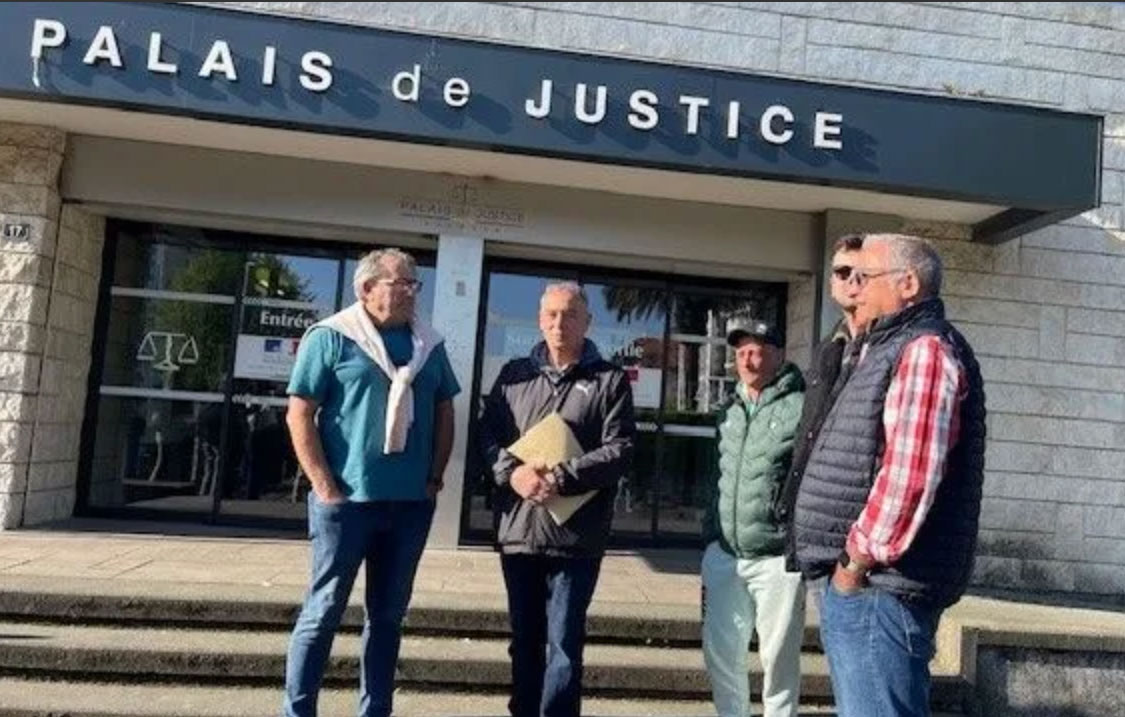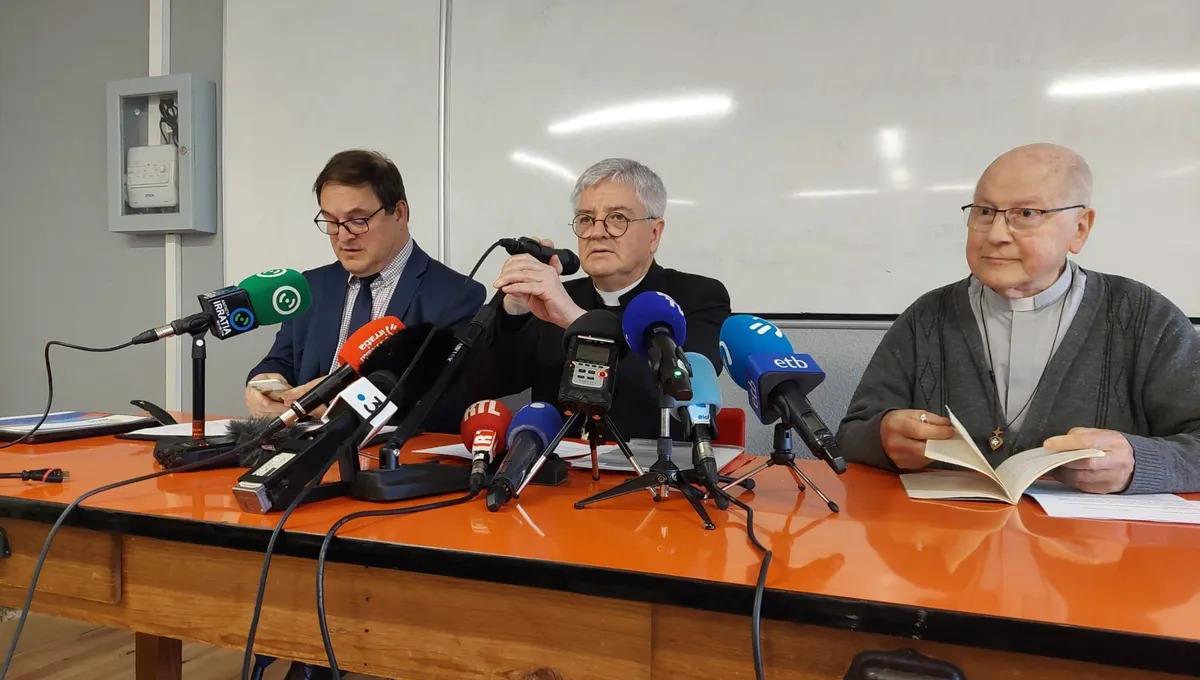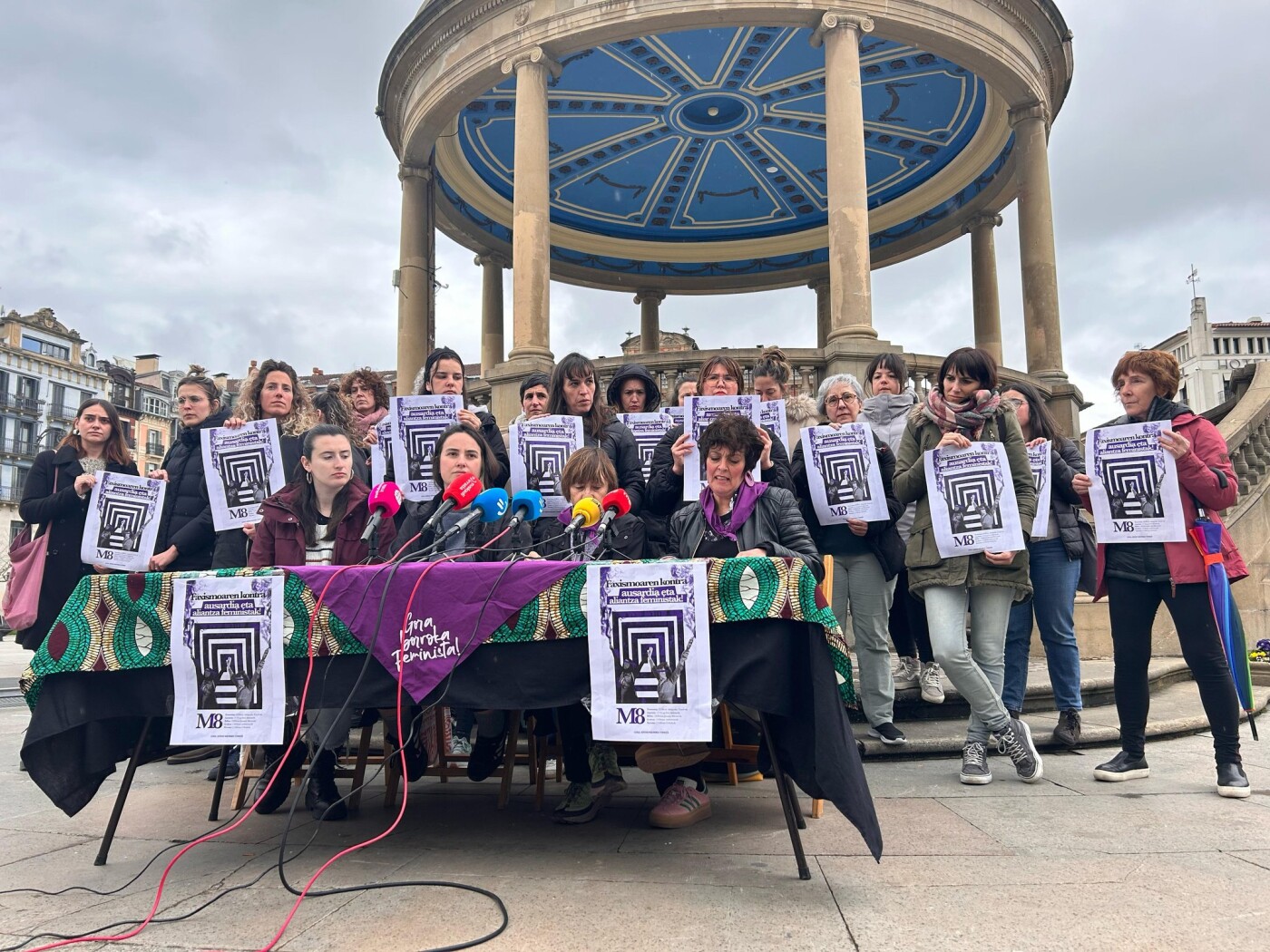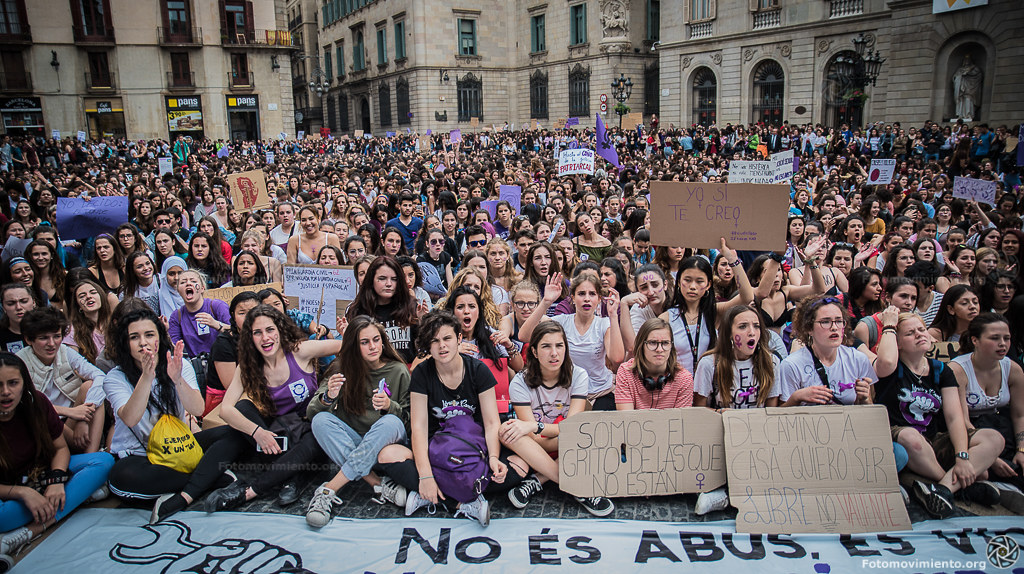Reflections on the management of male attacks from the anarchist perspective
- As the objects come out of the bag, one of the speakers is placed under the attentive look of the people who approach the talk. A bottle of water and a pack of scarves in a corner and, in front, at a considerable distance, a bag of nuts and a toothbrush. Sunglasses in the middle. And surrounding the three dots, the wires of the headphones. Far from the random dispersion of objects in space, it has intentionally placed them; it is the representation of a process based on transformative justice: the person attacked on one side and his protective team, the aggressor on the other and his monitoring team, the supervising group in the center and the community around them. In summary, the process will seek that the pain of the assaulted person be subtracted and that the assaulted person assume the responsibility of what he/she has done, promoting the personal transformation of the latter, preventing him/her from repeating what he/she has done in the future. Processes like this, which require the involvement of the whole community, allow collective work on male violence. The members of the Libertarian Assembly Heura Negra of Barcelona assure, by political intuition, that justice can be the best model for moving towards a new world without oppression. Yet, and do we make violators? (And what do we do with violators?) The book (Uncontrol, 2020) legitimizes any kind of response to attacks. There are currently no valid answers, magic attack management formulas, applicable to all casuistry. Without further extension, let us give the floor to them, because from the experience of those who put their legs in the barros they have a lot of knowledge to share them.

.jpg) It's neither cisgender nor heterosexual. He began his militant career in the student movement, and for five years Heura Negra was his militancy area, the libertarian assembly of the neighborhood of Vallcarca where he lives. He studied History of Art and is a mediating community by trade; Argelaga Mediació is part of the collective mediation. As an activist, he monitors people who have suffered or carried out attacks and participates in the management of aggression processes.
It's neither cisgender nor heterosexual. He began his militant career in the student movement, and for five years Heura Negra was his militancy area, the libertarian assembly of the neighborhood of Vallcarca where he lives. He studied History of Art and is a mediating community by trade; Argelaga Mediació is part of the collective mediation. As an activist, he monitors people who have suffered or carried out attacks and participates in the management of aggression processes. He began to militate at the University during the studies of Journalism and Anthropology. Communication and social relations arouse interest, which led the members of Black Heura to reach out with the objective of translating a fanzine about the attacks that occur in the fields of activism. “However, this timely collaboration has ended with the editing and promotion of a full book.” It is in this last task that they are immersed, not only in Catalonia, but also outside it.
He began to militate at the University during the studies of Journalism and Anthropology. Communication and social relations arouse interest, which led the members of Black Heura to reach out with the objective of translating a fanzine about the attacks that occur in the fields of activism. “However, this timely collaboration has ended with the editing and promotion of a full book.” It is in this last task that they are immersed, not only in Catalonia, but also outside it. and heterosexual man. He began his political activism within the framework of the M15 movement. He has been militating for eight years in the Libertarian Assembly Heura Negra de Vallcarca and currently also devotes hours of militancy to Llogateres Union. In the workplace, it has specialized in monitoring addictions and drug policies with an anti-punitive approach. It is interested in the involvement of men in the eradication of male violence.
and heterosexual man. He began his political activism within the framework of the M15 movement. He has been militating for eight years in the Libertarian Assembly Heura Negra de Vallcarca and currently also devotes hours of militancy to Llogateres Union. In the workplace, it has specialized in monitoring addictions and drug policies with an anti-punitive approach. It is interested in the involvement of men in the eradication of male violence.
They published the book with a clear objective: to contribute to the debate and practice in the management of male aggressions and in the construction of feminist spaces. I guess since the book saw the light so far, unfortunately, it would have been up to you to put some of the things in the book into practice, or to witness the processes that have done so. Can you draw conclusions from this experience?
David Tinoco: If we've learned something during this time, it's that we make the same mistakes, there and here, where they have no connection. When conducting the processes of aggression management, knowing other processes or giving talks on the subject, it impacts to always hear the same: “The same happened to us,” “punctually they have described what happened to us.” Mistakes and problems are always the same. So much so that you get scared, seeing how common they are and the few spaces that we are offering to think about how to manage attacks in our environment. It can be said that we have reached a point on this issue and that is where we are stuck.
Four Xicart: We have identified and identified the errors, so we know where we are at. The work to be done now is to delve into these errors, especially the deepest ones. Because it is not the same to say “we have started the process of managing an attack, we had no clear objectives, and therefore it has elongated in time”, or to say: “We have started a process and I have been covering patriarchal positions because the person named is my friend”, “in this case I have positioned myself more easily because the attack did not catch me so close”, “I did not want to manage an attack with these people because we have political distances”. These mistakes affect us more deeply inside. Because being an organized movement, being anarchists, we do a lot of practices on the margins of the system… what happens when we reproduce the same logics as that system? They make us ashamed.
It’s easy to say that “I’m not going to go to that tapestry, because I know there is a person who has committed an attack,” but everything gets complicated when the attack occurs in a nearby circle. And that's where defense mechanisms emerge, and we lose political meaning. A colleague shared with us a reflection on the process of managing the attack suffered by him. He told us that from the beginning he felt very careful – personally, relationally, we supported, he felt affinity – but at a political level we did not offer him support. In short, this requires public positioning and has consequences that can be very diverse. We already know the phrase: “Those who don’t move don’t feel their chains.”
Xicart: "Being an organized movement, anarchists, we do a lot of practices on the margins of the system… what happens when we reproduce the very logics of this system? They make us ashamed."
Tinoco: I would like to launch another couple of reflections from the process to this day. One: collectives are afraid to manage attacks, that's the first stop to start working on attacks. Another: men are not prepared. The latter is one of the main difficulties I see; many processes based on transformative justice go wrong because the men who have been appointed are not up to what these processes require. Because reaching that level requires many efforts, many commitments and a lot of political and gender awareness. And we're not at that level.
Moreover, the accumulation of all this is that when the processes go wrong for the reasons we have mentioned, the men who have not lived up to what the process required are more marked and more crushed than those who have suffered the aggression and tried to start the process. The person who has done the aggression is putting the paw of the manual, but instead of questioning whether that man has been at the level that the process required, the focus is on how dissident women and genders point to us, and questions the process itself, the measures taken or the demands on the other side. But mistakes come more from us. On the other hand, there have been advances, changes, transformations, new ideas have been created, different forms of intervention have been proposed and reflections have been made… many innovations, I have seen there the interest to find new techniques. On the contrary, on our side – and on which I stand – it has not happened, and also when processes go wrong, we begin to say “what has been pointed out from this space, when it has done no more than that” or “how heavy is that woman!”. And in those cases, you may have to remember that the assaulted person has had the will to initiate a transformative justice process, and that he is risking a lot for you to work. This is to put value.
Xicart: Pulling away from what you said, we see how patriarchal logic is once again imposed. Because a person who points to several positions ends up feeling guilty and isolated. Because, often, the person who caused the pain denies what is accused of, or the victim gets on paper – “How can you do this to me?”, “I don’t see what has been pointed out to me” – and that is where patriarchal logic, reversing the situation: the person who committed the attack is a victim. That is when the person who has pointed out begins to doubt himself, to question whether or not this is true, whether it is an attack or not. And if the community protects what's been pointed out, what Tinoco has explained happens. And so the person who's made the point often ends up asking for forgiveness, telling him that maybe he's been wrong.
All of this links with a perception I've had during reading the book. As we read about transformative justice, it seems to me that the application of this type of justice requires a level of knowledge and/or training on male violence for proper management. Because when there are deficiencies in this sense and an attack is known, logic and patriarchal inertia always emerge that end up becoming victimized and victimized, and victimized.
Tinoco: I think training is important, but it can also be a trick in one sense: it can lead us to think that we do not have enough training and not intervene for that. And as long as we do not become impoverished, we will not start proper management. So how do we deal with the lack of training? Well, with humility.
Oriol Oliva: Humility and training since today. But the lack of training is no excuse for not intervening in management. Such a process has different roles and phases. If you lack training and are aware of it, you don't have to be on the front line, but you can be protecting people on the front line from a background. And in the meantime, in addition, you will be forming. But the lack of training is no longer an excuse for shirking responsibilities.
.jpg)
They stress the importance of gradually developing this subject. In this sense, as you have already mentioned in the intervention, you have a proposal: to create and develop a culture of aggressive management.
Xicart: That's it. In view of the culture of rape in force, we propose a culture of aggressive management. If we have principles as a group, we have a responsibility to enforce those principles. Therefore, when someone attacks or points out a machist attitude – pointing out attitudes can also be conflictive in the collectives – if this indication is annulled, it is possible that a second person who wants to point out more positions dares to take that step. And that drives change, because it allows more people to do the same thing tomorrow. Thus, spaces can become safer and safer.
To be nuanced: when we talk about the management of macho attacks, we understand the attacks in their broadest sense. We are also talking about the diverse attitudes and dynamics that occur within the collectives, closely related to the roles of power and level, with a more systemic scope.
Tinoco: Following the specifications, how does it develop in collective cultures of aggression management? Devoting time and space to the work and debates on the subject. To the extent that the management of aggression becomes a task for us, as much as we feel our self-management.
Tinoco: "We have the ideals quite assumed, but what we lack is culture, materializing ideals in everyday practices"
“That’s already done,” can many people who read this. But there are many of us missing from that task. I do not think I am mistaken if I say that it is women and dissident genres who deal with it. Men are not there, but if we want to create a culture of attack management we need our involvement. It is not something alien to us. Perhaps we are not taking the role fully seriously, or we have not placed it among the functions of self-management, but rather as something proper to feminism, understanding feminism as something of other people, collectives and spaces. Consequently, we understand the management of aggression as something alien to us. And then, when an attack marks someone, we don't have any instrument in front of the situation, and let's pave.
Olive: With this rule of three, the creation of a culture of aggression management will facilitate their management, which will probably lead to a reduction of them. Or we hope. When we know what to do with rapists, there may be fewer rapists.
Tinoco: We have the ideals quite assumed, but what we lack is culture, materializing ideals in everyday practices. That's why we talk about culture, because it refers to what's rooted and what a community has in common. Otherwise, we could talk about the ideal or theory.
Olive: The word culture derives from the same root as the word culture. It is something that is being watered down and flourishing gradually. This is the culture of managing the attacks we want for our spaces and communities.
Of all forms of justice, the book delves into transformative justice. Why?
Tinoco: Without fear of making mistakes, we can say that state justice, criminal justice, brings nothing to the transformation of reality. Prison has not ended crime, the war on drugs has not made drug use and trafficking disappear… Regardless of your ideology, we can say that it can be empirically and scientifically proven that it is an unsuccessful system. From this point of departure arises the need to seek new horizons, and from our political position, transformative justice is the time horizon that we find more interesting because it seeks to prevent the attack from happening again. Therefore, the book shows a commitment to transformative justice. However, I would say that the wager of the book is not transformative justice in itself. The real bet of the book is to legitimize all kinds of answers. If we've devoted more pages to transformative justice, it's because it's the path that we find most interesting for further research and deepening; we think it's the one that we've developed least and it's the one that's most needed to make changes. By ideological intuition, we think that is what can lead us to a better world. However, since these models of justice were in their infancy, they did not fully meet the needs, we legitimized any response to the attacks. Because we are talking about aggressions, attacks with pain and trauma, which often need to be observed. It must also be placed in the centre. Sometimes, the damage caused by aggression cannot be seen through the path of restorative justice and transformative justice, and criminal mechanisms can be the ones that help us to settle. And we're not going to annul that.
Tinoco: "The real bet of the book is to legitimize all kinds of answers. If we've dedicated more pages to transformative justice, it's because it's the path that we find most interesting for further research and deepening. From ideological intuition, we think that is what can lead us to a better world"
Xicart: I should like to add that the damage caused by some attacks is unrestrained and that in these cases coexistence between the aggressor and the aggressor will not be possible. The person who has suffered the attack and suffered the pain will probably reach a point where he will be able to continue his life. But this doesn't mean it can relate to the person who attacked him. But even in cases where pain is impossible to subtract, transformative justice can be useful if we are interested in changing the person who has committed the attack so that the same does not happen again.
The opposite can also happen, as one Member pointed out in his speech today. There are attacks that don't cause trauma, but that's why they're still attacks.
Tinoco: Often, non-traumatic attacks don't put them on the table or manage them. And maybe in those attacks we have the opportunity to continue exploring and experiencing restorative justice and reforming justice, because there are no traumas. But this risks a non-traumatic attack ending the trauma.
They say that the real bet of the book is to legitimize all kinds of answers. Often, in the name of anti-punitivism and arguing that violence is patriarchal, feminists are required – indirectly, if you like – to eliminate any means of internalizing the use of violence. Also of the sectors that have historically demanded and used direct action and self-defense. It's something I'm suspicious of. Are they introducing hidden resistances with these arguments?
Tinoco: I believe that the question to be asked is: And where did we come from? We have come from not denouncing the aggressions, from the lack of visibility of them, from not talking about aggressions… Now they are on the table and we have begun to question how they are put on the table. Perhaps we should ask ourselves: well, because the way to put on the table the attacks that were so clear is another, why have we not started before? Perhaps the problem is that we have not put the piles up until the attacks start coming out to the table. For perhaps these forms have been necessary for us to begin to be aware of the problem we have with attacks in our spaces.
Xicart: There is a false imaginary according to which groups or communities like ours, formed by partisan struggles, outweigh the logic of the state. And from this point of departure, self-defense so accepted in other respects is annulled to respond to male violence.
Self-defense against the structure of oppression of the State. Self-defense is to stop a eviction, self-defense is to respond to each other in their own way during the demonstration, self-defense is to organize a popular food to reclaim public space. For, keeping the same logic, there is another structure of oppression that is called patriarchy, and before it we also use self-defense. Like the state, because it is the structure that carries out oppression. Just as we value the diversity of responses against the state, we also value the diversity of responses against patriarchy.
Olive: There's a sentence that says that anarchism doesn't take away what you have from the male chauvinist. .jpg)
Xicart: With regard to punitivism, I believe that this term is a dangerous instrument that can be used by men. You can say: “This action is punishable. And as an anarchist and I'm against the state, I'm going to criticize anything that is punishable, or I think so." And there we can go into another topic: who decides what is punishable and what is not. The same applies to attacks: Who decides what the attack is and what doesn't? Because cisgender men always end up deciding what the attack is and what not, what is punishable and what not. We are following the same pattern as the state. Re-appropriation of the term punitivism to avoid responsibilities when what they should do is very different. Reflection is what they should do: “What is my impact on the world as a white cisgender man and how I am receiving the signals that make me.” Because if I am reading from punitivism… is it because I feel perhaps punished? And why do I feel punished? At this point, the following conclusion can be reached: “I understand, I’m punished because I’m losing privilege, I’m losing comfort.”
Xicart: "We often focus on vetoes. But we don't focus on informal or invisible vetoes. They are the ones that occur when the attacked person, after raising his voice, does not receive protection and ends up abandoning that space"
I will not deny that in the face of the Machian attacks there is no action that can enter the parameters of what is called “punitivist”. In any case, I do not like this term much, but it is an open debate, there we are also navigating. But I do want to stress that those who have suffered aggression in the face of a series of attacks do not have the support of the community; I have only felt myself with aggression, and in the face of that there is a desire for punishment or revenge, which comes from a heartbreaking pain, because you feel alone and with all the weight of the structure on your shoulders. And now I have the question of whether to define as “revenge” the response we give of this pain is not, once again, a consequence of patriarchy. Because patriarchy also defines roles: who should be the person who is not defended, the person who is calm, the person who listens… If you defend yourself, you start to emerge from that binary logic, and that has consequences.
Tinoco: I believe that the issue of vetoes is related to what we are talking about. Today, the veto is an instrument in question. Whether it is punitive or not, there is the debate. The veto of the aggressor can be considered a punishment. Possible. But does that turn into punishment? If the veto is applied so that the assaulted person continues his life and militancy, to guarantee security spaces, etc. We're not punishing. Even the veto may be necessary to initiate and ensure the process of managing the attack as a condition. That the aggressor read it as punishment? It is possible, but it is actually being applied as an instrument of transformative justice.
Xicart: And as we keep pulling at it, let's talk about an informal veto. Because we often focus on vetoes, discussing whether they are punishments or not, or from the libertarian or anti-capitalist legitimate perspective. But we don't focus on informal or invisible vetoes. They are the ones that occur when the attacked person, after raising his voice, does not receive protection and ends up abandoning that space. If we were to hold the accounts, on the one hand counting the formal vetoes and on the other the informal vetoes, I believe that the graph of the informal vetoes would be considerably larger.
Olive: If we had an internalized attack management culture, surely the understanding of vetoes would have been different. It would not be a pity, but an opportunity for change.
Xicart: In relation to all this: it is important not to provide discursive instruments that allow further attacks. To give another example, in the collectives and communities the role of “person who excessively points to aggressions” suddenly occurs, because there is one or more people who point out “too many” aggressions. And with the creation of this role, the person is annulled with a firmer attitude to the macho attacks and everything that she has to say. He is accused of pointing out too much and of pointing out attacks and positions from a punitive point of view.
We have made progress, it is becoming increasingly difficult to say that aggression does not exist, and that is why other tools are now being used to shirk responsibilities.
Let's talk again about the transformative justice that is most addressed in the book. Although ideologically we find it interesting, it's not always applicable, right?
Olive: It is very important to take into account an aspect expressed in the book. The community must be very conscious and know when and when these processes are applicable. To initiate a similar process, a community with a certain affinity and network is necessary. Apart from this framework, the implementation of a transformative justice process will not work. Even in small frameworks with a certain affinity, trust and mutual knowledge it is difficult for these processes to thrive; if we apply them outside of them, for example at the district or neighborhood level, it will go hand in hand because we will not be able to put on the table certain necessary conditions. The community, the collective, must look in the mirror and wonder if there are conditions to initiate such a process. Perhaps the most sincere thing is to acknowledge that it does not exist.
Xicart: In this case, we must be aware that the aggressor will be left with the pain caused by the attack. According to Oriol's indications, if the community or the collective are not able to initiate a different process, they have to be prepared to evaluate another type of response. We pay close attention to the response of people, but not so much to what we have done as a community to protect the assaulted person.
Olive: "If the community has not led the aggression along the transformative path, do not complain of other responses"
Olive: We cannot cancel something if we have no alternative. If the community has not led the aggression along the transformative path, do not complain about other responses. Because he has not been, or because he has not been or has not been able to be. In any case. But don't complain.
Another essential condition for starting a transformative process is the willingness to transform the aggressor person. However, we are not used to being identified as aggressors.
Xicart: When pointed out, the issue can be as simple as silencing for a moment and repeating itself: “They have pointed at me and at that time I am not able to accept what they have told me, because I do not see what they have pointed at me.” And then we can try to identify the defense mechanisms that are on us. “I have been turned on the defense and survival mechanisms because I want to remain part of the team, because I don’t want to be an attacker of the group.” If this exercise is achieved, the group can be thanked for the designation and, if necessary, indicate that we need time and space to internalize the appointed. Because saying “yes, yes, I understand”, when it isn’t, is absolutely false and we need to act from honesty.
Tinoco: At this point I would like to reinforce a sentence that Lau usually says: “Thank you for pointing out.” This phrase has tremendous political content, as it puts on the table the importance of creating a new world and the difficulty of doing so at the same time.
Olive: The point is the vote of confidence. If you tell me, it's because you think I could change and become a better version of myself. If you don't believe it, you can break your legs. But with the indication comes a message: “Make it, Benga, give it change. For this you have opportunities and spaces.”
Olive: "Signaling is a vote of confidence. If you tell me, it's because you think I could change and become a better version of myself."
Xicart: It is necessary to collect the mark and work to understand it. If not, what we have said before is that the people who have pointed it out suffer a revictimization, so it is they who make the collective famous. And so there are people who have been pointed out only in the collectives.
Tinoco: Or what you dare not point out.
Xicart: That's it. Well said. And so -- we're not building a very new world.
Olive: So we're creating a disgusting world.
They talk about the need for honesty. This also seems to be an essential variable for carrying out a transformative process.
Xicart: Trust is important. It happened to me that I did not want to start a process, because I perceived that the interest of the other party was to recover the pain caused by the signal. It didn't seem to me to start from honesty and intention to make a change. He only perceived the desire to get rid of the person who has committed an attack. And I don't think what I'm saying is objective. When a person is part of recognition and honesty he notices.
Oriol: You notice -- or not. There are very well faked people, with a very careful attitude and aesthetics, but inside and with unfortunate ethics. In the long run, it almost always speaks the truth. But there are people who can keep appearances for a long time, I think.
Tinoco: It has to be said that there are people who start honest processes and we do not believe. And we don't believe them because there's a mistrust, which is legitimate.
I think the follow-up of the person who has done the aggression will be among the headaches. So how do you do it?
Tinoco: First, the audit team and the assaulted person should assess the follow-up of the assaulted person. To participate in it is necessary a long-term involvement and the members of the group must have a gender perspective. Trust among team members is also important, but that is true, bearing in mind that it is not a group of friends, but something more formalized.
It is good that in the follow-up group there are people with different degrees of proximity to the aggressor. For example, a person who has heard of the process may participate but does not know anyone involved in it, if the subject has been questioned. This would be tremendous because there is a way to start learning to manage these types of processes: it allows learning, the process does not hurt so much because they are not close to those involved in it and we can act more responsibly from this lack of proximity. On the contrary, the presence of members closer to the person who committed the aggression is beneficial because it allows to create a comfortable space. If it opposes this comfort and estimation, the aggressor can better assimilate the received, which can favor the transformation.
Xicart: It is also important to create that space of trust so that the aggressor can express what he really thinks. Because that person can have will, they can be aware of their role in the world, but they may not see some things clear. And it's better that those you don't see clearly can be made known, because if you explain and work together, you can transform. Listening to some things that that person can say can be very painful for their community or for the aggressor, but the tracking team can listen. Otherwise, the processes will be false.
Olive: On the other hand, the aggressor's monitoring team should be mixed, and should not consist solely of persons other than men. As we have commented further back, men are not present in these types of processes. We're a big part of the community, and if we're daring, the attempts to transform it are geared towards failure.
.jpg)
Tinoco: Yes, in these processes we bet on mixticity, and I think this surprises some people. Of course, we understand that the protective equipment of the injured person is non-mixed, and in no case do we question it. But we do think that all groups can be mixed.
Xicart: Yes. It is up to the assaulted person to decide whether or not their protective equipment will be mixed.
Tinoco: I should like to add something to the monitoring group of the person who committed the attack. The members of this group should analyze why they are there. They cannot be part of this group if their real motivation is to ensure that the person who has committed the aggression is not covered in a space. We must be aware of the importance of participating in a process of transformation. In this sense, it is very important to analyze oneself and the reasons to participate in the process.
And let's go a little deeper. Specifically, the role of heterogeneous men in these processes. It is very important that we get to the process. “You have made the attack, so it is up to you to work in that direction,” if we participate in this position in these processes, the person who committed the attack will probably find it very hypocritical. It shall: “You are my friend, I know you, and although you have not been publicly denounced, I know you have done some things, although they may not be the same as the attack I have done, don’t come to give lessons now because we know each other.” In this way, we will generally find rejection. Therefore, it is important that this type of process is also seen as an opportunity for oneself, and that it is used to do personal work.
Normally, when a friend is pointed out for having committed the attack and I know the report of the aggression, I feel identified with something, it can be with certain attitudes, feelings… I don’t know, it can be identified at many levels. Sometimes it's very visual, sometimes it's more related to feelings. But in most cases – not to mention all – I am reflected, or a part of me. It is therefore important to take us to these processes to work. If we involve ourselves, the processes will be more real and for the aggressor will also be more honest, comfortable and easy, and will feel more accompanied. Putting into practice what I'm saying costs a lot, huh? Because I could say that this is something I do very well, but I too find it very difficult to assume the role I am describing in the words.
Olive: Perhaps we can insist on how the person who has committed the attack should not be monitored. The position in the hooliga that can be more subtle or more gamberra, the blink, the corporativism of men that sometimes comes out to us… are very dangerous.
Speaking of the follow-up of the person who committed the attack… the resolution of a transformative process does not have to restore the situation, right?
Xicart: It may happen that the aggressor has completed the whole process, but then, for example, he cannot return to his former militancy space. The pain caused can be so intense that restoration is not possible. Because in some cases it happens that at the end of the process, that person says: “Well, done, right? So I can come back tomorrow and all right, right?” And that whoever suffered the aggression in that moment lived a violent situation, because he felt obliged to share the space with the person who caused so much pain and could not subdue the pain.
In this case, this person should remember that he was not there to return to that space, but to transform it, and the important thing is to prevent that transformation from happening and from happening again. Doing the process from honesty means accepting it. And if the aggressor is something he seeks with the process for the veto to to be removed, he will have to say from the beginning, and who has suffered the attack may or may not accept it. If you do not accept it, goodbye to the process.
Another aspect to consider in the book is that without community it is not possible to carry out a process based on transformative justice. The reason is clearly explained: “There can be no conscious community responsibility if there is no community.”
Tinoco: Concluding that punitive justice does not work, we began to look for new references. But where do we start? We started to look at places without state, or where the state does not act with logics like ours. In the countries of origin, we draw inspiration from indigenous peoples and draw ideas. What happens is that in these fields the word community has a different meaning than here. Therefore, we can say that what we have done is colonize the concept, adapt it to our measure and formalize it in our own way, creating a monstrosity that drinks from the aforementioned sources. And now we have a term -- community -- that has different meaning in one and the other, and there's the first problem. We have come to this reflection thanks to the indications given to us by the racist people, who have highlighted the colonial tone of our proposal.
Xicart: "It's because you point out or denounce an attack on the community, consider that space safe and trust. Wait for follow-up. And when it doesn't, that's where the second attack happens: revictimization."
We work in Barcelona, in a very large city. What does the community mean in Barcelona? Where does the community stay when they attack me and tell me what I do not deal with the situation when I only have to move to another neighborhood? Nor would it have to travel around the city. I can go to another neighborhood and continue with my life, and that's possible because the community doesn't question me involves the force that transformative justice demands. Being aware of the models of justice based on models of community that do not exist in us, we have elaborated our own proposal, concretizing what we understand as a community in a city like the West or Barcelona before a transformative justice process, and what roles or roles would be in the transformative process and what functions the community would have.
Olive: Thinking about community is complex. There's something very nice, but sometimes chimeric. We have defined it as something that is formed a posteriori. Once the attack occurred, the people who move and feel challenged would form the community.
Suppose we've seen the conditions for starting a transformative process in the face of an attack. What would be the role of the community?
Olive: Although the community is undetermined, it can have several important roles. One of them can be the care and accompaniment of people who are at the front line of the process. For example, to analyze how the situation is, to ask questions to know if the process is going well, to observe if there is bottleneck, to be alert to know if the people in the front row are smoking… The community has to be present but without highlighting, it has a secondary role, but very necessary.
Another important task for the community is to avoid rumours as much as possible. We are social beings, we talk to each other, and it can happen that information about the case spreads. If you notice that this happens, if names and other data are being issued, the community should deactivate it as soon as possible. Similarly, if someone has questions that are not caused by the morb, the community can answer them, or at least tell them where to go to ask them for an answer. “Ask there” or “do not ask that question to that person, because it would cause pain”, can give indications.

The community must evolve with the process. Because if they differ from each other, it can be difficult to rematch and continue the process. This differentiation may be due, for example, to the total immersion of some people in the process and the disconnection between the first and the second lines.
Tinoco: Another issue that needs to be put on the table to deepen the role of the community: Does the community trust process management and the monitoring team? That trust is important. I don't mean that the community has to value them, but if there's that valuation, there's more chance that the process will go well. It is true that this aspect should be treated with caution, as the community may reject the process and the supervising team for the reasons already mentioned [instead of focusing on aggression, questioning the response to aggression; rejecting certain measures on the grounds that they are “punitive”; annulling concrete people because they “point out excessively” attacks or macho attitudes, etc. ]. Beware of this. But unanimity can help a lot.
Xicart: It's because you point out or denounce an attack on the community, consider that safe space and trust. Wait for follow-up. And when it doesn't, that's where the second attack happens: revictimization. I lived it on my skin and it was very painful. I had internalized that I had the possibility to suffer attacks from cis men throughout life, but I never expected from the community. I was expecting a different answer, and the fact that I had not received the right answer was what caused me the most.
And having said that, I want to point out the resistance that can be triggered in the community. We have mentioned some earlier, but we have focused more on individuals. They are also activated at Community level, as a dynamic of community rescue. And maybe sympathetically, but you can say, "Well, you should also understand the other side," or, "But did you realize the attitude you've had as well?" They may not say “I don’t think so,” but that’s the subliminal message.
Xicart: "If you strongly signal attacks, wrong. And if you use a lighter form, no one hears you."
Let's not say if there's neurodivergences. Neurodivergences are a weapon to disarticulate the story of the attacked person. If you're a depressed person like me, you've been diagnosed with a disorder, and the community is aware of it, it can use it to nullify your word. The community could put this on the table and honestly say: “The truth is that it’s costing me to help you in this process, because you have obsessive tendencies and I think from time to time that you’re getting all this right.” It would be terribly painful to hear it, but I don't know if it's more painful when they say it subliminally. And in doing so, all the responsibility lies behind the aggressor.
In the end, you can think of who has pointed out the attack: “I have tried to put the attack on the table in a less painful or hard way, and my word has not been taken seriously. As I haven’t done so hard, people have decided to pass.” But on the contrary, if you give a stronger answer, people tell you why you're responding that way. Therefore, if you firmly point out the attacks, wrong. And if you use a lighter form, no one hears you. I therefore do not know what we should do.
Monstrosity, a term you also use. I believe that the deconstruction of monstrosity can be the key to involving men in the management of aggression. But for those who don't know. What do we talk about when we talk about monstrosity?
Olive: There's an academic word, teratology. In Greek therathos means monster, and teratology is the science that studies monsters, of course social monsters. And monstrosity would be to form a monster to something that is not a monster. A lot of things can be monstrous, everything that in the past was called “deviation,” for example, which moves away from the direct person model according to the norm.
Tinoco: Personally, when you know that a member has attacked, the first thing I get out is to passionately reject what he has done. As I’m totally opposed to the attacks, “I don’t feel identified with this” is the first thing that comes out to me, and it’s also important that you publish it so everyone sees that I’m against the attacks, no doubt.
Tinoco: "As a man, if you're honest, you'll see yourself in the account of the attack. Perhaps not in attack, but perhaps in the feelings that have led to the attack, or… many things, the attack internalizes many logics and some of them question me."
The truth is that for men this is not so true. If you're honest, you'll see yourself in the attack story. Perhaps not in attack, but perhaps in the feelings that have led to aggression, or… many things, the attack internalizes many logics, and some of them question me. It would be simpler to think that the people who have committed the attacks are monsters. But what is a monster? The monster is one that acts outside the logic in force in a specific community or society. Oh, if they were monsters! If you want! The truth is that they are not monsters, it is half the population that sometimes has these attitudes or commits them. Identifying ourselves as monsters means hiding the structural character of the problem, and also men release us from being responsible for the aggressions, because our responsibility for the aggressions is also eliminated. That is why it is so important to review the monstrous approach, not to downplay the attacks carried out by our neighbours, but quite the opposite: to realize that we also have to do with those attitudes of our colleagues, and that when a process is initiated by the aggression of one of our colleagues, we can also use it to work with us.
The problem before us requires the involvement of men, but if we look at those who have approached the conference, the majority was not male. What reception has the book had from men?
Xicart: Several people who have self-positioned as men have occupied a great deal of space in post-conference debates. Besides a very theoretical position. This confirmed us in the interventions in choosing to speak from a more personal place, especially in those sections that most directly question men. Indeed, we do so to undo that participation from theory. Because in theory you can find comfort, but if you talk from the staff, all the discomforts are down.
In general, from our experience, I would say that cisgender men are not, to a large extent, present in these processes. And if you participate, you participate in more theoretical things.
Tinoco: We men are not taking this issue seriously, we are not working very hard on the aggressions we do and their impact on the people who have attacked it, we are not participating in the spaces where we talk about these issues, we are not attending the acts organized by our colleagues who are not men to talk about these issues, and we are not participating in those that talk about the issue of aggression, patriarchy, privileges, etc. Men should ask, why aren't we participating? Why aren't we in those spaces that matter to us? Ninety-seven per cent of the attacks are made by ourselves, and this is something that we are perfectly questioned about. So why aren't we? Sometimes we consider it a thing of feminists, of people who are not men, and we do not consider it our place. “They will talk about managing attacks and how to respond.” And I can retweet or I like to retweet what they say, or I can complain about what they say to a friend.
“It’s not the most important thing right now.” It can be another source of courage. “People don’t have to eat, there are evictions, we have more important things. This issue is not so important at this time, not even to dedicate as many hours as to meet on Saturdays.” What's behind this? Well, we don't connect with the magnitude of the impact of our attacks. We don't understand it, we haven't set ourselves for a moment to listen, to read, to understand the stories of aggression. We have not devoted time to reading about the attacks and their impact, and it will not be for lack of material, as it is documented in time very later.
Tinoco: "It's not the most important thing right now." What's behind this? Well, we don't connect to the magnitude of the impact of our attacks."
Another reason is that these spaces are uncomfortable for men. Let's imagine you're a man and you're going to our conference, you know there will be someone watching what kind of people have come together and somebody judging what they might say, or maybe they don't pay as much attention to what you have to say. It may also happen that you do not have the same weight you can have in other spaces. And that's not what men are used to, so they're uncomfortable spaces. And the question is: Is it bad that they're uncomfortable spaces? Should we make them comfortable for men? I think not, it is a point of discomfort, because it responds to reality. Because the reality is the existence of structural violence. The discomfort of these spaces can also be part of teaching. I'm not going to tell a man that maybe he's comfortable in such a space, I'd even like there weren't men who are comfortable in that space, because this question has to ask us. Compared to the discomfort our non-male partners have suffered throughout their lives, the discomfort we can feel in these spaces is much less and more bearable.
And another reason, very classical, is that we're daring, because all of this is accompanied by loss of privilege, and that's not appealing. Our lack is clearly related to this.
Xicart: In conclusion, I would like to point out that these reasons are not reasons, and that if we describe them as such, they are excuses. Having said that, I would like to add one last thing: if we go for mixed spaces, we must leave it with the responsibility that this entails.
Tinoco: So what, are we or are we not?
Prentsaurrekoa eskaini dute ostegun honetan Marc Aillet Baionako apezpikuak, elizbarrutiko hezkuntza katolikoko zuzendari Vincent Destaisek eta Betharramgo biktimen entzuteko egiturako partaideetarikoa den Laurent Bacho apaizak. Hitza hartzera zihoazela, momentua moztu die... [+]
Antifaxismoari buruz idatzi nahiko nuke, hori baita aurten mugimendu feministaren gaia. Alabaina, eskratxea egin diote Martxoaren 8ko bezperan euskal kazetari antifaxista eta profeminista bati.
Gizonak bere lehenengo liburua aurkeztu du Madrilen bi kazetari ospetsuk... [+]
11 adin txikikori sexu erasoak egiteagatik 85 urteko kartzela zigorra galdegin du Gipuzkoako fiskaltzak. Astelehenean hasi da epaiketa eta gutxienez martxoaren 21era arte luzatuko da.
Matxismoa normalizatzen ari da, eskuin muturreko alderdien nahiz sare sozialetako pertsonaien eskutik, ideia matxistak zabaltzen eta egonkortzen ari baitira gizarte osoan. Egoera larria da, eta are larriagoa izan daiteke, ideia zein jarrera matxistei eta erreakzionarioei ateak... [+]
Elizak 23 kasu ditu onarturik Nafarroa Garaian. Haiek "ekonomikoki, psikologikoki eta espiritualki laguntzeko" konpromisoa adierazi du Iruñeko artzapezpikuak.
15 urteko emakume bati egin dio eraso Izarra klubean jarduten zuen pilota entrenatzaile batek.
Lestelle-Betharramgo (Biarno) ikastetxe katolikoko indarkeria eta bortxaketa kasuen salaketek beste ikastetxe katoliko batzuen gainean jarri du fokua. Ipar Euskal Herriari dagokionez, Uztaritzeko San Frantses Xabier kolegioan pairaturiko indarkeria kasuak azaleratu dira... [+]
Bi neska komisarian, urduri, hiru urtetik gora luzatu den jazarpen egoera salatzen. Izendatzen. Tipo berbera agertzen zaielako nonahi. Presentzia arraro berbera neskek parte hartzen duten ekitaldi kulturaletako atarietan, bietako baten amaren etxepean, bestea korrika egitera... [+]
Martxoak 8a heltzear da beste urtebetez, eta nahiz eta zenbaitek erabiltzen duten urtean behin beren irudia morez margotzeko soilik, feministek kaleak aldarriz betetzeko baliatzen dute egun seinalatu hau. 2020an, duela bost urte, milaka emakumek elkarrekin oihukatu zuten euren... [+]
Neska adingabeari sexu abusuak era jarraituan egin zizkiola frogatutzat jo du Bizkaiko Lurralde Auzitegiak.
1989tik 2014ra, Frantzia mendebaldeko hainbat ospitaletan egindako erasoengatik epaituko dute. 74 urte ditu Joel Le Scouarnec zirujau ohiak, eta espetxean dago beste lau sexu eraso kasurengatik.
Lau mila karaktere ditut kontatu behar dudana kontatzeko. Esan behar ditut gauzak argi, zehatz, soil, eta ahalko banu polit, elegante, egoki. Baga, biga, higa. Milimetrikoki neurtu beharra dut, erregelaz markatu agitazioa non amaitzen den eta propaganda non hasi. Literarioki,... [+]









